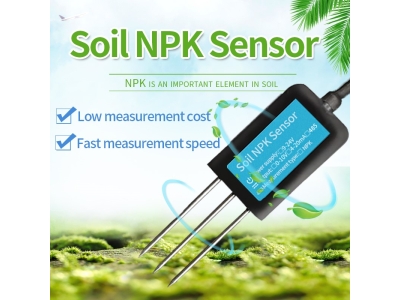Soil health management is a critical aspect of sustainable agriculture, as healthy soils are essential for optimal crop growth, nutrient cycling, and ecosystem resilience. Traditional soil management practices often rely on manual observations and assumptions, leading to suboptimal resource utilization and potential environmental degradation. However, with the advancements in sensor technology, farmers now have access to advanced sensor solutions that offer real-time data on soil conditions, enabling precise and targeted soil health management. This article explores the role of advanced sensor solutions in enhancing soil health management, highlighting their benefits, challenges, and future prospects.

Real-time Monitoring of Soil Parameters:
Advanced sensor solutions provide real-time monitoring of various soil parameters, such as moisture content, temperature, nutrient levels, and pH. By deploying these sensors throughout agricultural fields, farmers can obtain accurate and up-to-date information on soil conditions. Real-time monitoring facilitates precise irrigation scheduling, ensuring that crops receive the right amount of water at the right time. It also enables targeted nutrient management, reducing the risk of over- or under-fertilization.
Improved Water and Nutrient Management:
Water and nutrient management are crucial for maintaining soil health and optimizing crop productivity. Advanced soil sensors allow farmers to monitor soil moisture levels and nutrient content in real-time. This information helps farmers make informed decisions about irrigation and fertilization, ensuring that plants receive the necessary resources while minimizing waste. By optimizing water and nutrient usage, farmers can reduce costs, conserve resources, and minimize the risk of nutrient runoff and groundwater contamination.
Precision Fertilizer Application:
Traditional blanket fertilizer applications often result in inefficient nutrient distribution, leading to uneven crop growth and potential nutrient imbalances. Advanced sensor solutions enable precision fertilizer application based on site-specific soil conditions. By mapping nutrient distribution within the field, farmers can apply fertilizers only where needed, optimizing nutrient uptake and reducing excesses or deficiencies. This targeted approach improves fertilizer efficiency, reduces environmental impact, and promotes balanced crop nutrition.
Early Detection of Soil Disorders and Diseases:
Soil disorders and diseases can significantly impact crop health and yield. Advanced sensor solutions can detect early signs of soil disorders, such as salinity, acidity, or nutrient imbalances, allowing farmers to take timely corrective actions. By monitoring key soil parameters, farmers can identify potential issues before they escalate, reducing the need for excessive chemical interventions and ensuring long-term soil health and productivity.
Data-driven Decision Making and Predictive Modeling:
The data collected by advanced soil sensors can be integrated with other agricultural data, such as weather forecasts, crop growth models, and historical yield data. This integration enables farmers to make data-driven decisions and develop predictive models for optimal soil health management. By leveraging advanced analytics and machine learning algorithms, farmers can gain valuable insights into optimal planting times, crop growth stages, and yield potential. Data-driven decision making enhances productivity, reduces risks, and improves overall farm management.
Challenges:
While advanced sensor solutions offer significant advantages in soil health management, several challenges need to be addressed. Sensor accuracy and calibration are critical to ensure reliable measurements. Standardization of calibration procedures and quality assurance protocols is essential to maintain consistency and comparability across different sensor models. Additionally, data management, interpretation, and integration from multiple sensors present challenges, requiring robust infrastructure and analytical capabilities. Cost considerations and accessibility issues may also limit the widespread adoption of advanced sensor solutions, particularly in small-scale farming operations.
Future Prospects:
The future prospects of advanced sensor solutions in soil health management are promising, with ongoing advancements in technology and research. Miniaturization, wireless connectivity, and Internet of Things (IoT) integration will make sensors more affordable, accessible, and widespread. Additionally, advancements in data analytics, artificial intelligence, and remote sensing technologies will enhance the interpretation and analysis of sensor data, enabling more accurate soil mapping, predictive modeling, and decision support systems. The integration of advanced sensor solutions with other precision farming technologies, such as drones or satellite imagery, will further improve farming efficiency and sustainability.
Conclusion:
Advanced sensor solutions play a vital role in enhancing soil health management by providing real-time data on soil conditions, enabling precise and targeted resource management. By leveraging these solutions, farmers can optimize water and nutrient management, improve fertilizer application practices, detect soil disorders early, and make data-driven decisions for optimal soil health and crop productivity. Despite challenges in accuracy, calibration, data management, and accessibility, ongoing advancements in technology and research hold great promise for the future of advanced sensor solutions. With continued investment, collaboration, and innovation, these solutions will revolutionize soil health management, promoting sustainable agriculture, and ensuring food security in a rapidly changing world.





